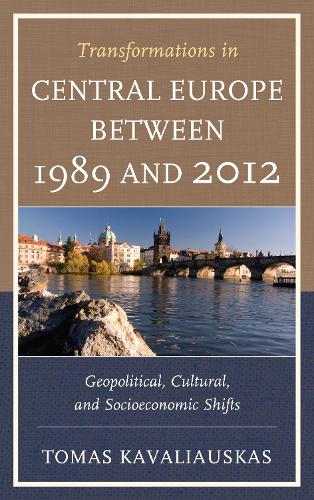
Transformations in Central Europe between 1989 and 2012: Geopolitical, Cultural, and Socioeconomic Shifts
(Paperback)
Publishing Details
Transformations in Central Europe between 1989 and 2012: Geopolitical, Cultural, and Socioeconomic Shifts
By (Author) Tomas Kavaliauskas
Bloomsbury Publishing PLC
Lexington Books
9th June 2014
United States
Classifications
Professional and Scholarly
Non Fiction
Political control and freedoms
Far-left political ideologies and movements
943.0009049
Physical Properties
Paperback
236
Width 155mm, Height 227mm, Spine 17mm
349g
Description
Transformations in Central Europe between 1989 and 2012: Geopolitical, Cultural, and Socioeconomic Shifts by Tomas Kavaliauskas, is an in-depth study of the transformations in Central Europe in the years since the fall of Communism. Using a comparative analysis of geopolitical, ethical, cultural, and socioeconomic shifts, this essential text investigates postcommunist countries including Estonia, Latvia, Lithuania, Poland, the Czech Republic, Slovakia, Hungary, Romania, Bulgaria, and Slovenia. Next to transitological interpretations, this study ventures upon negative and positive freedom (Isaiah Berlin) in Central Europe after two decades of post-communist transition. Kavaliauskas questions the meaning of completeness of postcommunist transition, both geopolitical and socioeconomic, when there are many transformations that do not necessarily mean unequivocal progress. The author also analyses why Central Europe in 1989, armed with civil disobedience, could not maintain its moral politics. But the book touches sensitive issues of memory as well: an examination of May 9th is provided from the Russian and the Baltic perspectives, revealing two opposing world views regarding this date of liberation or occupation. Finally, Kavaliauskas analyzes the tragedy at Smolensk airport, which became an inseparable part of Central European identity. Transformations in Central Europe between 1989 and 2012 is an essential contribution to the literature on Central Europe and the lasting effects of Communism and its aftermath.
Reviews
Kavaliauskas provides rare depth and breadth of understanding across disciplinary divisions and across a variety of scholarly perspectives of the monumental and ongoing transformations in the heart of Europe. With an inquisitive yet unobtrusive gaze this book reveals for the reader the particularities but also the resonances and connections between diverse transition experiences. -- Annette Freyberg-Inan, University of Amsterdam
Tomas Kavaliauskas is an emphatic observer of the post-communist predicament. This catching set of essays on the contemporary condition of Central Europe, dense with philosophical allusions, cultural detail, and political insight, and written in an inimitable style, makes an unusual and refreshing, even romantic piece of scholarship. -- Maria Mlksoo, University of Tartu, Estonia
This is more than a book about the extraordinary changes in Central Europe. It is about the struggle for national and cultural identity in a troubled part of the world. The scholarship displayed by Kavaliauskas is as impressive as his civic engagement. -- Catalin Avramescu, University of Bucharest
In a 1980 essay on central Europe, Timothy Garton Ash observed that central Europeans are the "Europeans who ... know what it is really about and we can learn from them." It is "the kingdom of the spirit." Kavaliauskas's work should be read with Garton Ash's words in mind; it underscores that central Europe is still unique in so many ways. A major strength of the book is that Kavaliauskas (a Lithuanian) brings the Baltic states very much back into the discourse about central Europe. There is more to central Europe than Poland, the Czech Republic, Hungary, and the Balkans. However, this is basically a series of essays on culture, memory, history, identity, and philosophy; it is not a social science analysis of "stages of transition and consolidated democratization," but rather thoughtful and learned reflections on a profound historical moment of a region still caught between East (Russia) and West. The transition and transformations are still not complete. Having achieved a "negative freedom," can central Europe make positive use of the freedom that it gained in 1989 From the Pink Tank case to profound questions of memory, readers can still learn from Kavaliauskas's reflections. Summing Up: Recommended. Graduate, research, and professional collections. * CHOICE *
A collection of thoughtful essays on the embattled liberal values in post-communist polities, this volume is. . . of significant contribution to the ongoing debates on the distinctions between liberal and illiberal nationalism, and on the causes of the conservativepopulist backlashes in countries such as Slovakia, Hungary, Poland and Romania. Kavaliauskas successfully scrutinizes political, social and cultural trends in a maddeningly diverse region. . . The book is thus a gripping political and intellectual ethnography. * International Affairs *
Author Bio
Tomas Kavaliauskas is associate professor at Vytautas Magnus University in Kaunas, Lithuania.
